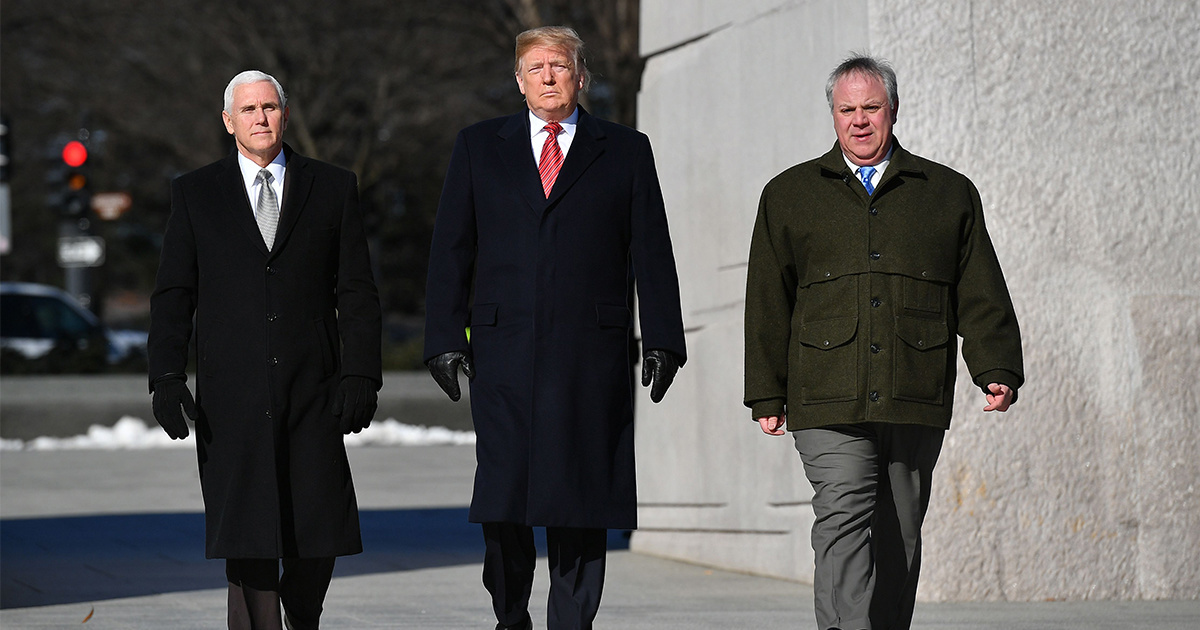
Trump Nominates ‘Walking Conflict of Interest’ David Bernhardt to Permanently Replace Zinke as Interior Secretary

Donald Trump, Mike Pence and acting Interior Secretary David Bernhardt in Washington, DC on Jan. 21. MANDEL NGAN / AFP / Getty Images
President Donald Trump officially nominated David Bernhardt—a former energy lobbyist environmental groups have described as a “walking conflict of interest”—to officially take over as interior secretary after Ryan Zinke stepped down in December 2018 following various scandals.
“It’s a humbling privilege to be nominated to lead a Department whose mission I love, to accomplish the balanced, common sense vision of our President,” Bernhardt wrote in a tweet responding to the president’s announcement, also made on Twitter Monday.
It’s a humbling privilege to be nominated to lead a Department whose mission I love, to accomplish the balanced, common sense vision of our President. https://t.co/4qKc66CGE6
— Secretary David Bernhardt (@SecBernhardt) February 4, 2019
As deputy secretary, Bernhardt played an active role in the Trump administration’s push to open public lands to fossil fuel and mining interests, and he is expected to continue this work if he is confirmed to permanently take over the department he has been running as acting secretary following Zinke’s departure, Reuters reported.
Deputy Secretary of the Interior David Bernhardt at a meeting of International Boundary and Water Commission officials from the U.S. and Mexico on Sept. 27, 2017Bureau of Reclamation
In 2017, around 150 environmental groups wrote a letter to the Senate urging it to block his nomination to the position of deputy secretary, arguing that his work as a lawyer and lobbyist for oil and water interests at Brownstein Hyatt Farber Schreck gave him too much past history with entities that could stand to benefit from Interior Department decisions. Despite this, he was confirmed 53 to 43, and now famously carries around a list of all his potential conflicts of interest, as The Washington Post reported in November of 2018.
“David Bernhardt is a walking conflict of interest who has no business overseeing America’s public lands,” Sierra Club Executive Director Michael Brune said in a statement opposing his permanent installation. “The Secretary of the Interior should be someone who respects the mission of the department and sees the value in our public lands and waters beyond their capacity to be drilled, mined, or fracked.”
David Bernhardt is a walking conflict of interest who has no business overseeing America’s public lands. https://t.co/jCJgnnDOPQ
— Sierra Club (@SierraClub) February 4, 2019
More recently, Bernhardt has come under fire for decisions made after he took over for Zinke as acting interior secretary. He was responsible for keeping national parks open to the public but understaffed during the government shutdown, a move that put both wildlife and visitors at risk.
“Our National Park System is more expansive, diverse and reflective of the American story than ever before. But it’s also a system facing many challenges, including threats from climate change, overcrowding, encroaching development and billions of dollars in needed repairs. And now, after the longest shutdown in US history, parks are dealing with a massive cleanup due to acting Interior Secretary Bernhardt’s irresponsible decision to keep parks open with minimal staff,” National Parks Conservation Association President and CEO Theresa Pierno wrote in a statement opposing his nomination.
BREAKING: "We have serious concerns with the nomination of David Bernhardt for Interior Secretary and cannot support someone who doesn’t have the best interest of our parks, wildlife, air and water in mind." NPCA's President & CEO @theresapiernohttps://t.co/D9MbsorCYz
— National Parks Conservation Association (@NPCA) February 4, 2019
Bernhardt also signed a memorandum authorizing parks to use visitor fees to cover maintenance costs and day-to-day operations during the shutdown, a move that some Congressional Democrats said was illegal.
As deputy secretary, Bernhardt also promoted efforts to weaken the Endangered Species Act and open the Arctic National Wildlife Refuge to drilling.
Trump has selected yet another unqualified nominee to head the Department of the Interior. pic.twitter.com/QUmDvPEed1
— Center for Bio Div (@CenterForBioDiv) February 4, 2019

 233k
233k  41k
41k  Subscribe
Subscribe 
